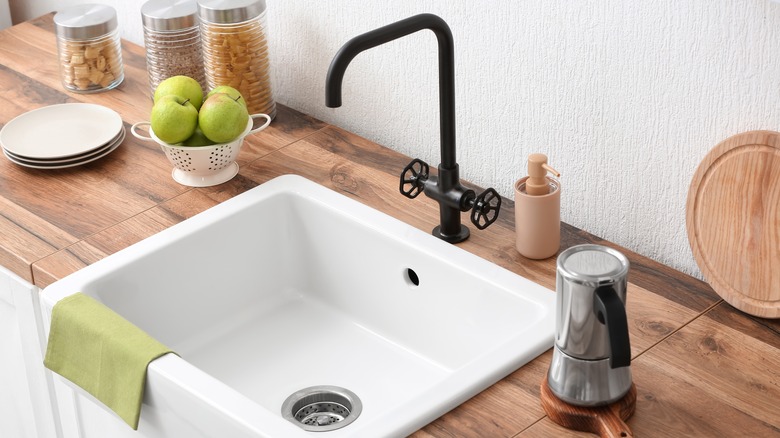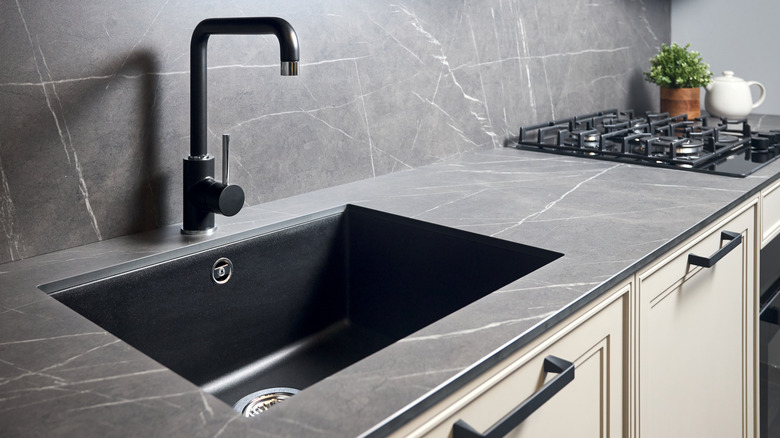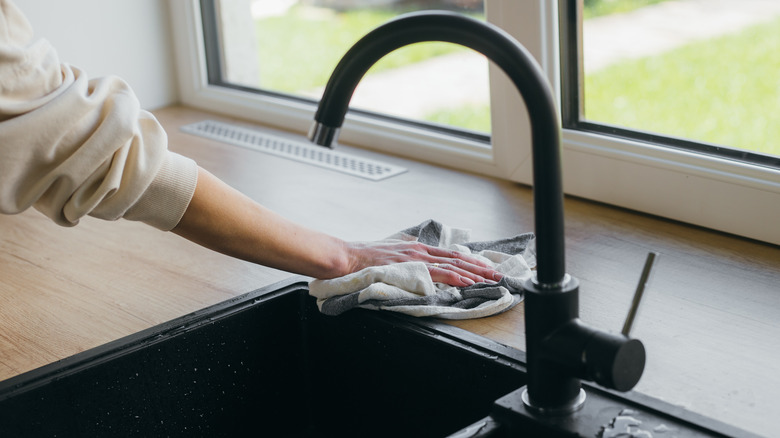Here Are The Pros And Cons Of Installing A Black Kitchen Faucet
Stainless steel and chrome dominate the kitchen faucet market, but black fixtures are slowly creeping up from behind. They are becoming a go-to for hardware that is sleek, modern, and classic. If you're looking for something unique that isn't just another fad destined to be outdated in a few years, you might be considering black tapware. Installing a black kitchen faucet has its pros and cons; for instance, while it is highly praised for its contemporary aesthetic, this dark feature may require a bit more upkeep than other traditional metal hardware.
When it comes to choosing the perfect kitchen faucet for your sink, design, cost, functionality, and maintenance all factor in. A visually appealing tap that is a magnet for water stains and fingerprints may not be worth buying. On the other hand, a pricier faucet with practical features and a timeless finish could be a good investment. With all the options out there, it's best to know what you're getting into, especially with the beautiful yet demanding black faucet.
Pros: beauty and design
From a design point of view, you can't go wrong with a black kitchen faucet. Black is a neutral color and will combine well with any cabinet, backsplash, or countertop style. You can incorporate it in different interior aesthetics too, from mid-century modern to farmhouse. Plus, It is a great option for mixing metals in your home decor, as the dark shade pairs nicely with other hardware. So, if you swap out the gold cabinet handles for silver knobs, you can leave the black faucet in place and still have a cohesive kitchen.
While black isn't what usually comes to mind when you want a pop of color, it can have the same effect. The dark metal contrasts against white sinks, bright tiles, and soft-hued counters for a sleek addition to your space. And you won't have to worry about the accented color going out of style as you would a hue from the rainbow.
Another pro of black faucets is that they are easily accessible. You can find the kitchen accessory online or at your local hardware store, much like you would other popular options. While matte is most favored, it is also available in several finishes, including brass, chrome, polished, and brushed, so you have just as much customization too. Further, the dark fixture is great at concealing fingerprints. However, despite all the benefits, there are a few downsides to installing a black kitchen faucet.
Cons: constant cleaning
Black faucets are visually stunning, but keeping them that way is going to take lots of effort. While fingerprints don't show up easily on the hardware, dust does. Be prepared to wipe the faucet weekly, if not daily, to keep it looking new. But you can't just clean black metal the same way you'd clean all of your household faucets. You must use the proper cleaning products and techniques, as harsh chemicals, wax-based products, and abrasive soaps can damage the faucet, causing scratches, stains, or discolorations that can't be reversed.
The biggest drawback to installing a black kitchen faucet is that the rich pop of color won't last forever. Regardless of the finish, the dark hue fades over time. After a while, you may notice the black fixture leaning on the gray side. Wiping the faucet with a microfiber cloth after each use can help maintain its original color, but it may just slow down its fading versus completely stopping it. If you choose to install a black faucet in your kitchen, it will be stunning, but be prepared for lots of cleaning and swapping it out when the time comes.


